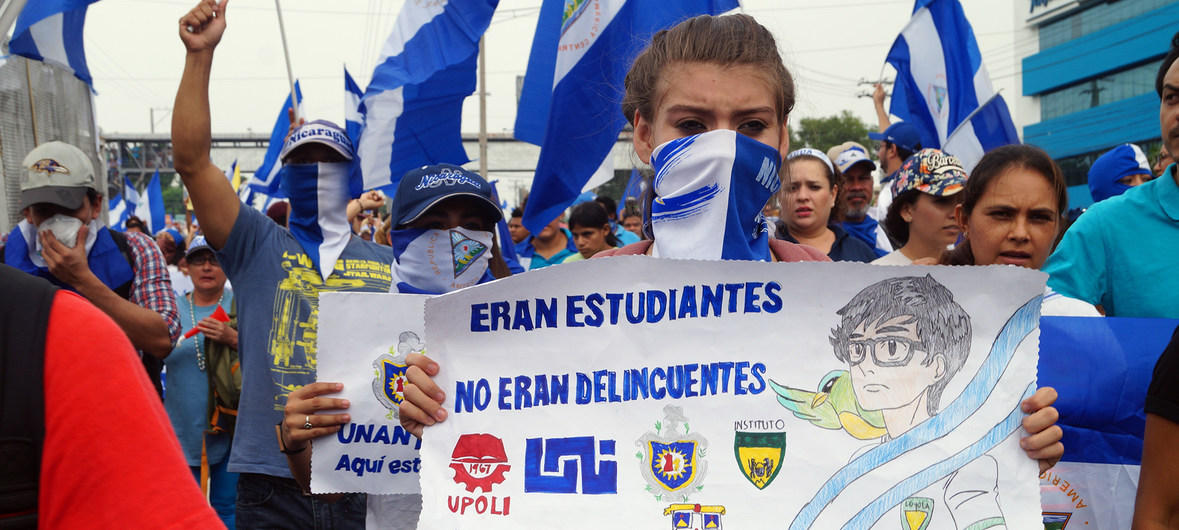Against the wishes of the Nicaraguan government, Niki Haley, the US ambassador, on Wednesday called a UN Security Council meeting to discuss if and how the UN should act in regard to the violence which plagues Nicaragua. Daniel Ortega, Nicaragua’s president, has employed lethal military and paramilitary force to defend the personal interests of his wife, his friends, and himself from protestors who are now calling for his removal from power. Although originally, the protestors, who are comprised of students and elderly alike, organized as a response to Ortega’s self-serving cuts to social-security, it became evident that they set their sights beyond that when failing to dissipate after Ortega retracted his plans.

With an increasing death toll of 448, over 2,000 injuries, and more than 12,830 Nicaraguan citizens seeking asylum in Costa Rica, the United States has decided that it is time to assist the people of Nicaragua in the protests against their government. However, Haley’s attempt at an intervention was resisted by the representatives of Nicaragua, Venezuela, Russia, and Bolivia who cite fears of reoccurring imperialist tendencies which accompanied so many of the United States’ past attempts to ‘help’ Latin American countries.
The Russian representative, Ambassador Vassily Nebenzia, recounted the history of the United States subverting governments under the guise of protecting human rights. The representative of Bolivia, Ambassador Sacha Sergio, stated that “history gives us very relevant lessons”, especially when it comes to Nicaragua and US interventions. And after recounting the aggressive actions of the United States through a series of rhetorical true or false questions, which always implied that the answer is true, the representative of Venezuela asks “who is the aggressor?”. Venezuela, Russia, and Bolivia defended Nicaragua’s tyrannical government by throwing Haley’s accusation that Nicaragua threatens the security of neighboring nations back at the United States.
One may assume that the question of whether Nicaragua is a security threat to its neighboring countries is beside the point when, as Felix Maradiaga, a Nicaraguan professor and human rights activist recounts, it is within Nicaragua where a 15-year-old student is shot in the neck and then refused treatment by the hospital. Adding that “one student is being killed every five hours.”
It is only because of the accusation that Nicaragua is a security threat to others that it can defend the tyrannical violence within their country and dismiss it as internal conflict of no concern to the UN security council. Despite this, Haley asserts that the United States wants to intervene “not just because we believe in fundamental human rights and expect them to be honored. But because our future is bound up with our neighbors in the Americas. Their prosperity is our prosperity, and their security is our security.” By this she is stating, essentially, that the United States not only wants to intervene for the sake of defending human rights, but also, as Nicaragua, Venezuela, Russia, and Bolivia fear, to defend and pursue its own interests. It is in Haley’s own statement that the Nicaraguan government found opportunity to resist an intervention and to continue slaughtering its own people.
Haley invokes memories of the horrors in Syria, Venezuela, and seemingly what she thinks is the path of Socialism. She states that “we shouldn’t be surprised Danial Ortega and Nicolás Maduro are cut from the same corrupt cloth. They are both students of the same failed ideology… with each passing day Nicaragua travels further down a familiar path.” Nicaragua fears the United States would continue its history of imperialist actions, while Haley fears that the Nicaragua will continue on the same path as Venezuela and other governments whose leaders claimed to be Socialists in the past. Each went into this UN Security Council meeting with the intention of preventing history from repeating itself, but in turn, acted out a dialogue which has been reoccurring for decades.












